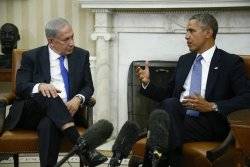President Barack Obama has staunchly defended the newly brokered nuclear deal with Iran by saying its critics' tough talk was good for politics but not for US security.
Top Republicans - as well as US ally Israel - have criticized Obama for agreeing to the deal, which the United States and its partners say may ultimately prevent Tehran from obtaining a nuclear bomb.
Under the interim deal, Iran will accept restrictions on its nuclear programme in exchange for limited relief from economic sanctions that have gradually crippled its economy and slashed its oil exports.
"Huge challenges remain, but we cannot close the door on diplomacy, and we cannot rule out peaceful solutions to the world's problems. We cannot commit ourselves to an endless cycle of conflict," Obama said to critics of the deal.
"Tough talk and bluster may be the easy thing to do politically, but it's not the right thing for our security."
Sunday's agreement, hammered out in marathon talks between six major powers and Iran in Geneva, aims to buy time to negotiate a comprehensive deal that the Obama administration hopes will lay to rest international concerns about Iran's nuclear programme.
Israel, however, has argued that a partial deal is a bad deal and that easing sanctions, even temporarily, decreases the leverage that the US and others have over Iran.
Having lost its battle to stop the international deal reached this week on Iran's nuclear programme, Israeli officials are already picking up the pieces and planning a fight to shape a final agreement that negotiators hope to reach in six months.
Israeli officials have said the final deal must go beyond freezing Iran's programme and roll back the achievements they say has made the Islamic Republic a threshold weapons state.
Prime Minister Binyamin Netanyahu, who believes Iran is determined to produce a nuclear bomb, harshly condemned Sunday's agreement between Iran and six world powers as a "historic mistake" and said Israel was not bound by the deal.
Obama, who has long been criticized for his desire to engage with US foes, took heat as a presidential candidate in 2008 for saying he would talk to Iran, which has not had diplomatic relations with Washington for more than three decades.
On Monday, however, he alluded to those foreign policy goals during remarks that were otherwise focused on immigration reform.
Election pledges
He noted that he had ended the war in Iraq and would end the war in Afghanistan next year, two things he also pledged to do as a candidate.
"When I first ran for president I said it was time for a new era of American leadership in the world, one that turned the page on a decade of war and began a new era of our engagement with the world," he said during a visit to San Francisco.
"As president and as commander in chief, I've done what I said."
Though the agreement forged in Geneva over the weekend is a first step, the White House sees it as a form of vindication for policies that Obama espoused long before he won the White House.
If Tehran follows through on its part of the pact, Obama said, it would chip away at years of mistrust between the two countries.
PHOTO CAPTION
In this Sept. 30, 2013, file photo, President Barack Obama meets with Israeli Prime Minister Benjamin Netanyahu in the Oval Office at the White House in Washington.
Aljazeera


 Home
Home Discover Islam
Discover Islam Quran Recitations
Quran Recitations Lectures
Lectures
 Fatwa
Fatwa Articles
Articles Fiqh
Fiqh E-Books
E-Books Boys & Girls
Boys & Girls  Hajj Rulings
Hajj Rulings Hajj Fatwas
Hajj Fatwas














